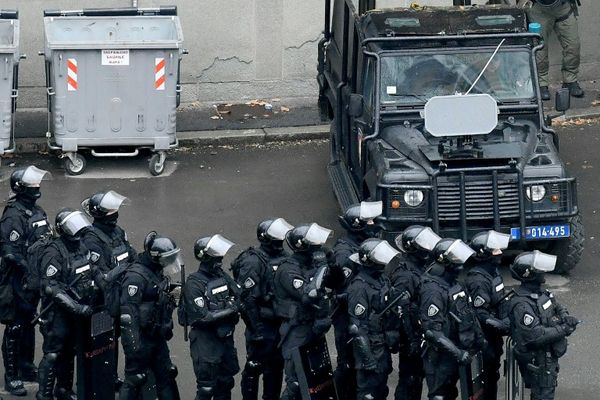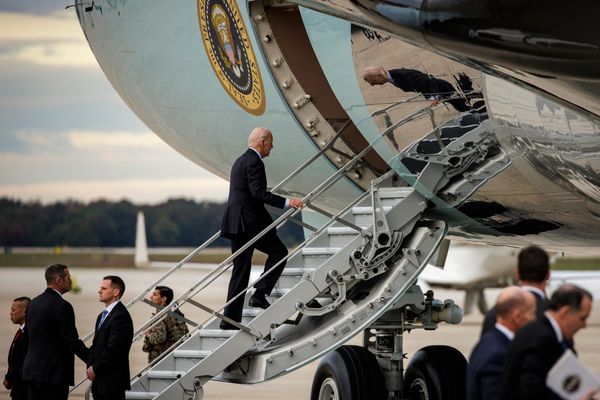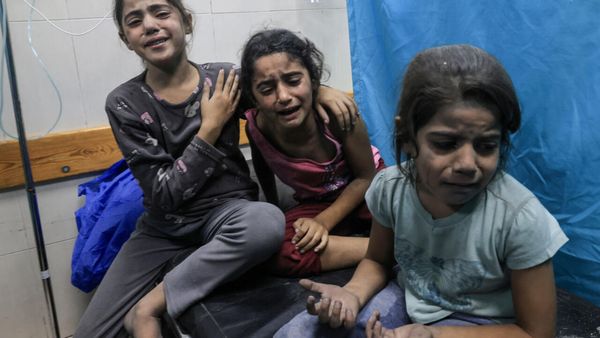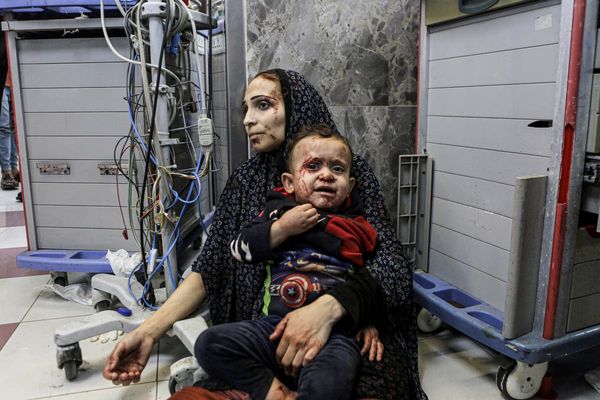
An attack on a hospital in the north end of the Gaza Strip on Tuesday left hundreds dead and injured, according to World Health Organization officials.
Beyond that vague assessment, however, there is little agreement. Palestinian officials have separately said it was an Israeli airstrike, while the Israel Defense Forces say that intelligence traces the attack to a failed Palestinian Islamic Jihad rocket.
Preliminary estimates of deaths at Al Ahli Arab Hospital vary from 200 to 800, WHO officials said at an emergency press conference late Tuesday, and injuries are estimated to be in the hundreds. At the time of the attack, the hospital was operational, "with patients, health and care givers, and internally displaced people sheltering there," one official said.
The attack was "unprecedented in scale," Dr. Richard Peeperkorn, a WHO representative for the area, said.
WHO Director-General Tedros Adhanom Ghebreyesus was midair during Tuesday's press conference, flying back to Geneva from Asia, said Dr. Michael Ryan, WHO's executive director of health emergencies, speaking in his stead.
Dr. Tedros, however, had been fully briefed, and has "already expressed his shock and condemnation," Ryan said, adding that the director-general was expected to make comments on the attack from Geneva the following day.
When asked if the attack constituted a war crime, Ryan said that international humanitarian law "calls for the protection of civilians, particularly for the protection of health care facilities and health care workers."
The WHO doesn't perform criminal investigations and can't declare war crimes, he said. "What we can say is that any attack on health care—any attack on health workers in this situation—is a violation of international law. The causation of that, it's impossible for WHO to determine."
He later referred to the attack as ferocious.
Al Ahli Arab Hospital was one of 22 hospitals in the north end of the Gaza Strip facing evacuation orders from the Israeli military—an order that the WHO and other agencies have said is impossible to carry out, due to insecurity in the area, the critical condition of many patients, a lack of ambulances, and a lack of alternative shelter, among other factors. Combined, the hospitals were treating more than 2,000 patients, and additional civilians have been sheltering in and around them, hoping they'd be spared from attacks, WHO officials said.
Israel's orders for the evacuation of northern Gaza must be reversed, the WHO reiterated Tuesday in a statement sent to press.
Tuesday's attack on Al Ahli Arab Hospital is one of more than 100 that have occurred on health care facilities since the beginning of the Israel-Hamas war a week and a half ago. Fifty-one have occurred in Gaza, according to WHO officials, and the rest have occurred in the nearby West Bank area.
More than 2,800 deaths have occurred in Gaza since last week, with almost 11,000 injuries, Peeperkorn said at a press conference earlier Tuesday with members of WHO's Office for the Eastern Mediterranean.
The West Bank had seen 61 deaths, with 1,250 injuries, he added.
Rafah border crossing still closed
The Rafah border crossing—the only entry point to Gaza, on its border with Egypt—is still not open, WHO officials said late Tuesday.
"I want to raise a plea: What is needed in Gaza now is immediate access," Peeperkorn said. "Rafah needs to open as soon as possible."
Hospitals in Gaza have only about a week's worth of blood supply left, he added.
As to why the crossing still isn't open after a week of various parties stating that it would be, Dr. Richard Brennan, regional emergency director for WHO's Eastern Mediterranean Regional Office, said the situation involved "a lot of different dynamics."
There is "a lot of, frankly, finger-pointing on this, a lot of diplomacy," Brennan said, adding that UN officials would soon arrive in Cairo, and he hoped they would be able to negotiate the opening.
Egyptian President Abdel Fattah El-Sisi agreed to facilitate the movement of health supplies through the Rafah crossing last week, Dr. Tedros has said. But getting supplies through requires the cooperation of both Egypt and Israel, as well as additional cooperation from Hamas.
If the crossing does open, Egyptian Red Crescent officials will ensure medical supplies enter first, a WHO official said earlier Tuesday.
While the WHO could establish field hospitals near the border in Egypt, Egypt has not requested such a move and may establish a field hospital on their own, they added.
Airlifts have been discussed, Brennan said, but they would require "the same type of clearances as border crossing."
"It's in the hands of diplomats and decision-makers at this stage," he added. "We're ready to go when they give us the green light."
While airdrops can be lifesaving, the amount of aid that can be delivered by plane is much less than what can be delivered by ground, Ryan said.
Even if the crossing were open, as fighting continues, "the conditions do not exist right now inside Gaza to be able to bring aid in safely," he added. "There must be a cessation of bombing in order to allow it."
While diplomats and politicians bargain and negotiate, the clock ticks—and lives are lost every minute, WHO officials said Tuesday.
"That needs to happen now, that needs to happen tonight," Ryan said. "Not tomorrow morning. This simply cannot wait."










